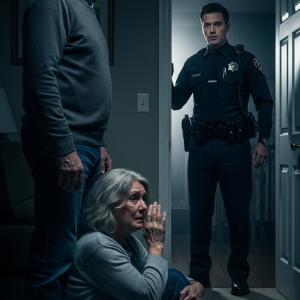The first crack in the façade appeared on a Tuesday. Lena and her husband, Mark, were meeting with their financial advisor to finalize the sale of a small commercial property. It was a deal months in the making. Halfway through the meeting, Evelyn, Mark’s mother, frowned with a look of theatrical confusion.
“A sale?” she’d asked, her voice a fragile, wavering thing. “Mark, dear, what is she talking about? I don’t recall agreeing to sell the Elm Street building.”
The financial advisor froze, his pen hovering over the paper. Mark shot Lena a look—not of suspicion, but of weary apology. Lena felt the familiar knot tighten in her stomach. “Evelyn, we discussed this last Thursday,” Lena said, keeping her voice even. “You agreed it was a wise move to liquidate.”
Evelyn’s eyes welled up with practiced tears. “Thursday? Oh, my dear, the days just… blur together. I’m so sorry. My memory, it’s not what it used to be.” She remembered, however, with perfect clarity, a minor disagreement they’d had over floral arrangements for a party three years ago, a topic she had brought up just that morning. This was the nature of Evelyn’s encroaching fog: a selective amnesia that conveniently erased major financial agreements but sharpened the memory of every perceived slight.
In the car on the way home, Mark was quiet, his knuckles white on the steering wheel. “She’s getting worse, Lena,” he finally said, his voice thick with a grief Lena knew was both genuine and expertly manipulated.
“Is she, Mark?” Lena ventured, treading carefully. “Or is she just getting smarter? She forgot a seven-figure real estate deal but remembered you preferred tulips to roses in 2022.”
Mark’s jaw tightened. “That’s not fair. She’s scared. You’re being cynical.” It was the same circular argument they’d been having for months. Lena was the cold, suspicious daughter-in-law; Mark was the devoted son, blinded by a carefully manufactured filial guilt. Evelyn played her part to perfection, appearing frail and vulnerable whenever Mark was near, a tragic queen losing her grasp on her own kingdom.
Lena knew she was being gaslit, not just by Evelyn, but by her husband’s love for his mother. The symptoms Evelyn described were too perfect, too… rehearsed. One evening, after Evelyn had recited a list of her cognitive failings that sounded suspiciously like a WebMD article, Lena made a call.
“David, it’s Lena,” she said, her voice low. Dr. David Chen, a brilliant neurologist and her closest friend from college, picked up on the second ring. “I need to ask you for a professional favor. It’s about my mother-in-law. She’s putting on the performance of a lifetime, and I need a critic in the audience with a medical degree.”
The boardroom at the law firm was cold, both in temperature and atmosphere. Sunlight streamed through the floor-to-ceiling windows, illuminating the dust motes dancing in the tense air. At the head of the polished mahogany table sat Evelyn, flanked by her smirking, reptilian lawyer, Mr. Finch. Mark sat beside her, his face a mask of anxious sorrow, occasionally patting his mother’s hand.
Lena sat opposite them, with her own counsel, feeling like a defendant at her own trial. The meeting’s purpose was to discuss the restructuring of the family’s assets, given Evelyn’s “accelerating cognitive decline.” It was, in reality, a meticulously planned coup.
Evelyn was magnificent. She was the very picture of tragic decay. Her gaze was vacant, her hands trembled slightly as she reached for a glass of water. When Lena’s lawyer began to speak, Evelyn leaned towards Mark, her voice a loud, heartbreaking whisper.
“Mark, who is that woman?” she asked, gesturing vaguely toward Lena. “She seems nice, but I don’t believe we’ve been introduced.”
The blow landed exactly as intended. Mark flinched, his face paling. He looked at Lena with eyes that pleaded for understanding, for softness, for a surrender she could not give. “Mom, that’s Lena,” he said gently. “That’s my wife.”
“Oh,” Evelyn said, a flicker of feigned, painful recognition crossing her face. “Oh, of course. Forgive me, dear. It’s just… so hard to keep faces straight these days.” She gave Lena a watery, vacant smile that was more damning than any accusation.
Mr. Finch cleared his throat, seizing the advantage. “As you can see,” he said, his voice dripping with false sympathy, “Mrs. Reed’s condition is precarious. It is our position that, to protect her interests, a majority of the controlling shares in the company should be placed in a trust, managed solely by… a more stable party.” He did not need to say who. The implication hung in the air: anyone but the calculating daughter-in-law. Evelyn’s plan was unfolding perfectly. She would use her “illness” to sideline Lena, consolidate control, and then, Lena suspected, make a miraculous recovery once the ink was dry.
The discussion continued, with Evelyn interjecting only with confused, childlike questions that twisted the knife in Mark’s heart. He was ready to concede everything just to end his mother’s apparent suffering. Lena let the charade play out, her own heart a cold, hard stone in her chest. Finally, when Finch began to slide the preliminary documents across the table, she spoke.
“Before we sign anything,” Lena said, her voice cutting through the room with quiet authority, “I believe it’s imperative we understand the full medical picture. The long-term prognosis is critical to these decisions.” She looked at Mark, her gaze softening. “For your mother’s sake.”
Evelyn and Finch exchanged a look of supreme confidence. This was a welcome interruption, another chance to medically validate their position. “An excellent suggestion,” Finch purred. “We’d be happy to hear from her doctor.”
“Wonderful,” Lena said, pulling out her phone. “Because I took the liberty of asking her consulting neurologist to be here today to present his final findings. He’s waiting downstairs.” She smiled coolly. “Dr. David Chen will be right up.” For the first time, a flicker of genuine, uncontrolled emotion crossed Evelyn’s face: a flash of pure, unadulterated panic.
Dr. David Chen entered the room not with a patient file, but with a laptop and a quiet, unassailable confidence. He was professional, his expression neutral, but his eyes, when they met Lena’s, offered a silent reassurance. He nodded politely to the room and, without preamble, connected his laptop to the large monitor on the wall.
“Thank you for your time,” he began, his voice calm and academic. “My goal is to provide absolute clarity on Mrs. Reed’s neurological condition to ensure she receives the most appropriate care.” Evelyn visibly relaxed, mistaking his professional tone for compliance.
The first image that appeared on the screen was a functional MRI scan of a brain, pockmarked with dark, inactive patches and areas of alarming atrophy. “This,” David explained, using a laser pointer, “is the brain of a 72-year-old male with clinically diagnosed Alzheimer’s disease. Note the significant decay in the hippocampus, the area responsible for memory formation.”
He clicked to the next slide. It showed a healthy, vibrant brain, glowing with activity. “And this is a healthy control subject of a similar age. The difference, as you can see, is stark.”
Mark stared at the screen, his face etched with dread, anticipating the image of his mother’s brain, expecting to see the same decay as the first slide. Finch leaned back in his chair, a smug smile playing on his lips.
“And this,” David said, his voice dropping slightly as he clicked to the third slide, “is Mrs. Reed’s brain, from her scans last week.”
The image that filled the screen was a blaze of color and light. It was fully active, robust, and showed zero signs of atrophy. But David’s laser pointer didn’t go to the hippocampus. It circled a region near the front of the brain, the prefrontal cortex, which was lit up like a Christmas tree.
“This is not the activity of a degenerating brain,” David stated, his voice now holding a sharp, clinical edge. “This is the heightened activity of the prefrontal cortex and the amygdala, a specific neural signature that occurs when an individual is actively suppressing a truthful memory and constructing a false narrative under questioning.”
He turned from the screen to look directly at Evelyn. “To put it in layman’s terms, Mrs. Reed’s brain isn’t failing. On the contrary, it’s working overtime… to maintain a deliberate and complex deception.”
The silence in the room was absolute, shattered only by a strangled gasp from Mark. Mr. Finch shot forward in his chair, his face turning a blotchy red. “This is outrageous! This is… pseudo-science! You are slandering my client!”
Evelyn erupted. “He’s lying! This is a trick!” she shrieked, her performance of a frail, confused woman shattering into a million pieces, replaced by the raw fury of a cornered animal. “Lena put him up to this! They’re faking these images to steal my money!”
David remained perfectly calm. He held up a hand. “I anticipated this reaction,” he said, clicking to his final slide. It wasn’t a brain scan. It was a toxicology report.
“We also ran a full blood panel,” David continued, his voice cold as ice. “We discovered an unusually high concentration of a compound found in the Ginkgo Biloba plant. While often used as a memory supplement in small doses, extreme overdoses can induce temporary symptoms of confusion, disorientation, and short-term memory loss, mimicking the early stages of dementia.”
He placed a small, clear evidence bag on the table. Inside was a bottle of high-potency herbal pills. “This bottle was found in Mrs. Reed’s purse during her last visit. The prescription is for a mild vitamin, but the pills inside are not vitamins.”
David looked at Evelyn, his professional demeanor giving way to a look of profound disappointment. He delivered the final, devastating diagnosis.
“Your condition is entirely curable, Mrs. Reed,” he concluded, his words echoing in the stunned silence. “It requires a simple, two-step treatment: Stop taking the pills, and stop telling lies.
The aftermath of David’s presentation was not an explosion, but a deafening, soul-crushing silence. The vibrant image of Evelyn’s lying brain remained on the monitor, a scientific testament to her treachery. Mr. Finch’s face was ashen, the smug confidence replaced by the frantic calculations of a lawyer who knew his case had just been publicly executed.
But the true devastation was etched on Mark’s face. He stared, not at the screen, but at his mother, as if seeing her for the very first time. The frail, victimized woman he had spent months defending had vanished, replaced by a stranger with cold, hard eyes filled with rage and panic. The grief on his face slowly curdled into a look of profound, horrified disillusionment.
“All this time,” Mark whispered, his voice cracking. “All of it… a lie?”
Evelyn tried to rally, to summon the tears and fragility that had been her greatest weapons. “Mark, baby, he’s twisting things. She’s twisting things! They are trying to turn you against me!”
But the spell was broken. The magic was gone. “Turn me against you?” Mark’s voice rose, filled with a pain that was awful to behold. “You didn’t just lie to me, Mother. You used my love for you as a weapon against my own wife. You made me believe my wife was cruel, that I was a bad son if I didn’t protect you. You made me a fool.” He stood up, his chair scraping loudly against the floor. “You made me your accomplice.”
That was the word that finally broke her. Accomplice.
The legal destruction was swift and brutal. With undeniable evidence of premeditated fraud—an act that could carry criminal charges—Mr. Finch immediately moved into damage control. The aggressive trust documents were shredded. Lena’s lawyer, now holding all the cards, drafted a new settlement. Evelyn was forced to sign an agreement that stripped her of her controlling shares in the family business and placed her significant personal assets under the management of a court-appointed third-party trustee.
The psychological irony was the most devastating punishment. The addendum to the agreement cited her “history of manipulative and fraudulent financial behavior” as the reason for the oversight. The very weapon she had chosen—the pretense of losing control—had become her reality. She had faked a mental prison only to find herself locked in a very real financial one. She wanted to play the part of someone with no power, and now, in the ways that mattered most to her, she truly had none.
Weeks later, the dust had begun to settle. Mark had severed all contact with his mother. The betrayal was too deep, the manipulation too monstrous to forgive. He and Lena were slowly, carefully rebuilding the trust Evelyn had so systematically tried to destroy.
One evening, they were sitting on their porch, watching the sunset paint the sky in hues of orange and purple. The silence between them was no longer tense, but comfortable and healing.
“I’m so sorry, Lena,” Mark said quietly, taking her hand. “I should have listened. I should have trusted you.”
Lena squeezed his hand, her heart filled not with triumph, but with a quiet, somber relief. “She fooled you because you have a good heart, Mark. You wanted to see the best in your mother.” She leaned her head on his shoulder. “The lies are over now. We can just be us.”
They sat there together, watching the last of the light fade. The elaborate, toxic theater was closed for good. Evelyn was alone in her gilded cage, a queen of a fallen empire of lies, forever haunted by the bright, damning glow of a mind that had been too clever for its own good.




